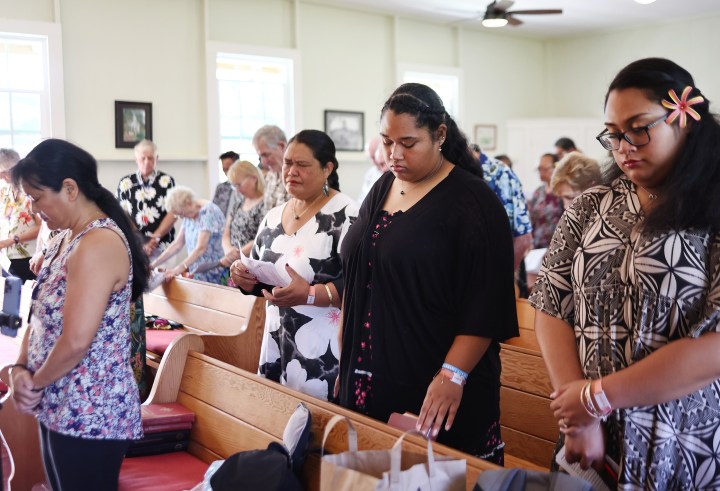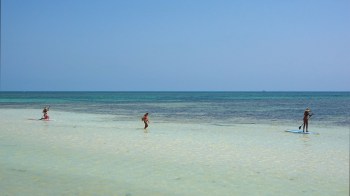
Is it unethical to vacation in Hawaii?
Share Now on:
Is it unethical to vacation in Hawaii?

On Oct. 8, West Maui began reopening to tourists after being devastated by deadly wildfires that left nearly 100 people dead and destroyed or damaged more than 2,200 buildings. The economic damage of these fires could reach as high as $16 billion.
But residents protested the decision, delivering a petition with over 3,500 signatures to Gov. Josh Green that asked him to postpone the reopening.
“We are not mentally nor emotionally ready to welcome and serve our visitors. Not yet,” said restaurant bartender Pa‘ele Kiakona at a news conference according to the Associated Press. But others say they need the business from tourism because their livelihoods depend on it.
“Because Maui relies so much on tourism, it’s almost like you have no choice. Or, your choices are limited versus if you had a diversified economy,” said Malia Akutagawa, an associate professor of law and Hawaiian studies at the University of Hawaii at Manoa, who was born and raised on Molokai, Hawaii’s fifth largest island.
Beyond Maui, Native Hawaiians have also raised broader concerns about the ethics of visiting Hawaii in general, pointing out that tourism has led to environmental degradation and fueled income inequality.
The consequences of tourism
Tourism represents about a quarter of the state’s economic activity. Back in 2022, 9.2 million visitors came to the state, with total visitor spending reaching $19.8 billion, up from about $13 billion in 2021.
“We need tourism. It is the economic engine of this state,” said Jerry Agrusa, a professor of travel industry management at University of Hawaii at Manoa.
Despite the economic revenue that the industry generates, Native Hawaiians point out that residents aren’t partaking in those profits.
“I think folks need to understand that global corporate tourism is fundamentally an extractive industry. I don’t think people think about or want to think about going on vacation as contributing to extraction. But that’s exactly what they’re doing. It’s an uncomfortable truth,” said Hōkūlani Aikau, director of the Indigenous Governance Program at the University of Victoria.
Global corporate tourism relies on the unskilled — and sometimes skilled — labor of local residents who are paid below a living wage in order to support the tourists who are able to afford these trips, Aikau explained.
“There’s inherently a class divide there,” she said.
She added that extractive tourism also involves the appropriation of the local culture, which becomes “commodified and sold to tourists.”
A study from Florida State University published in 2019 found that workers in the leisure and hospitality industry get paid the least out of all labor industries. While the average weekly wage in the U.S. stood at $710, those who worked in this industry got paid $311 a week.
The inability to afford basic necessities like shelter is also pricing out Native Hawaiians.
Hawaii has one of the highest housing prices in the country, with the median home price standing at $713,000. Residents spend an average of 42% of their income on rent, which is the highest percentage in the U.S., according to an analysis from Forbes Home.
A report from Aloha United Way found that the number of Hawaiian households living in poverty grew from 9% in 2018 to 15% in 2022.
Agrusa said he does think tourism has helped fuel housing prices, but pointed to Airbnb and short-term vacation rentals as catalysts.
He explained that people have been buying homes and apartments, converting them into short-term vacation rentals, which ends up limiting the housing supply. He noted that they’re helped by Hawaii’s property tax, which is the lowest in the country.
“The problem is ‘the haves,’ those who have the money that can invest in this, are pushing out those who are renters,” he said.
A report from the Hawaii Appleseed Center for Law & Economic Justice found that short-term vacation rentals in Hawaii rose from 17,000 units to 23,000 units between 2015 and 2017, a 35% increase.
This year, the University of Hawaii Economic Research Organization said that there are 30,000 short-term vacation rentals.
Experts with UHERO looked at what would happen if short-term vacation rentals were completely barred from Oahu, finding that median home prices would be 4% to 6% lower than they currently are.
“If these price reductions were realized, Oahu would still suffer from extremely high home prices,” the researchers wrote. “However, the roughly 5% reduction in housing costs would represent a sizable improvement in the standard of living for renters and first-time home buyers, particularly lower-income residents for whom housing costs represent a large share of overall expenses.”
In response to a request for comment, an Airbnb spokesperson said over email:
“Vacation rentals have helped support Hawaii’s tourism economy for decades by offering affordable accommodation options to visitors whose spending supports local businesses and residents. The truth is the number of vacation rentals in the state has remained relatively unchanged in the past decade since the founding of short-term rental platforms such as Airbnb. The focus instead needs to be on building more housing to help alleviate the state’s housing affordability challenges and advocating for sensible short-term rental policies that support the state’s tourism economy.”
Airbnb said Hawaii’s vacation rental economy predates Airbnb, and that the share of housing units in Hawaii already used as vacation rentals (i.e. seasonal and recreational homes) has remained the same over the past decade. Airbnb explained that this suggests that seasonal homes are shifting toward short-term vacation rental use, not that long-term housing is shifting toward short-term vacation rental use.
Is there a way to operate an ethical tourist economy?
Aikau said she knows that many rely on the tourism industry, and that a decline in visits does financially affect residents.
“I have multi-generations of family who have been supported by the tourism industry,” Aikau said. “So I get it. Tourism feeds family. But as an institution connected to corporate global corporate tourism, their wages are not what the shareholders are getting.”
Because of tourism, Akutagawa at the University of Hawaii at Manoa said there are areas that now feel foreign to her because of the change they’ve undergone.
“I have very fond memories, childhood memories of Waikiki,” she said. “What tourism does is it divorces you from the places that are special to you.”
Akutagawa said the people who live on Molokai, an area whose economy does not rely on tourism, have a traditional Hawaiian lifestyle. People who live on the island describe it as having a cash and subsistence-based economy.
“We can eat off the land. And there are a lot of things that we can still gather and a lot of people have gardens,” she said. “What that does is it gives you a sense of autonomy, that you’re more self determined. You can say no to tourism.”
Some say there are ways to manage a tourist economy in a responsible or ethical manner or that it can operate if it’s controlled.
“There could be more investment in local agriculture/fisheries and all the local businesses that relate to a healthy, robust local food ecosystem. There could be real investment in the green economy – renewable energy that is produced locally and used locally,” Aikau said.
The Molokai Rural Development Project, where Akutagawa once worked as a director, sponsored a Responsible Tourism Plan that laid out guidelines on how responsible tourism can operate, which include protecting the environment and culture of the region, limiting the number of people who can visit, and offering culturally authentic activities.
Akutagawa said a ship from American Safari Cruises once came to Molokai’s harbor more than a decade ago, which elicited backlash and prompted her and other residents to protest the company.
Eventually, the island’s residents and American Safari Cruises were able to reach an agreement, allowing the company to come to the area. Some of the terms included a cap on the number of people allowed to visit and a promise from the ASC to shop at local vendors.
“We laid down certain rules and said, ‘OK, if you agree to these conditions, then you can come,” Akutagawa said. “We had the cruise ship sign onto that and the community activist leaders signed onto the agreement, as well as the state and the county. So we avoided litigation. And we allowed tourism on our own terms.”
There’s a lot happening in the world. Through it all, Marketplace is here for you.
You rely on Marketplace to break down the world’s events and tell you how it affects you in a fact-based, approachable way. We rely on your financial support to keep making that possible.
Your donation today powers the independent journalism that you rely on. For just $5/month, you can help sustain Marketplace so we can keep reporting on the things that matter to you.


















